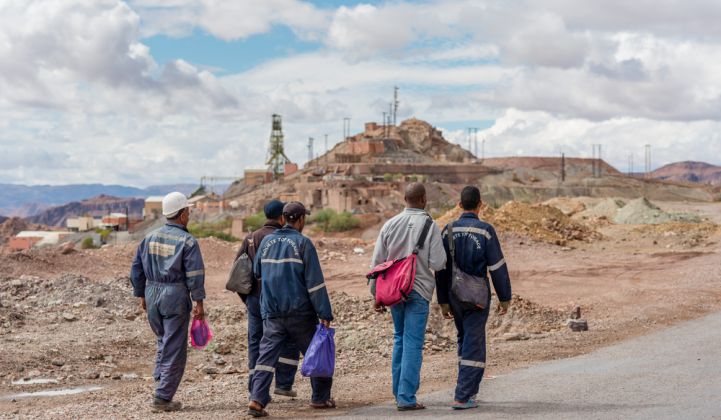The majority of exported cobalt, a key component of lithium-ion batteries, originates in the Democratic Republic of Congo. Much of the production comes from small and artisanal mines, where cobalt is plucked by hand. In 2014, UNICEF estimated that about 40,000 children worked in DRC’s mines.
Those conditions have led to pressure from non-governmental organizations, commitments from companies to source conflict-free products, and even a promise in September from the DRC government to eliminate child mining by 2025.
But in November, Amnesty International noted that only Apple and Samsung SDI had taken adequate action on cobalt sourcing. Tesla, BMW, Daimler and General Motors all fell in the "minimal" to "moderate" action categories, according to a survey of the industry. In Amnesty International’s rankings, EV leader Renault hadn’t taken any action.
Where there’s a problem, though, there’s blockchain. A new alliance between blockchain companies DLT Labs and Cobalt Blockchain Inc. aims to make the entire cobalt supply chain transparent and conflict-free — and they think industry giants will pay for it.
“The glue that’s going to hold together this web of people who want to co-venture and want to improve the supply chain is actually blockchain,” said DLT Labs CEO Loudon Owen. “We can do it today, we can do it now. There’s no reason to delay.”
Right now, the cobalt supply chain is very physical, with real commodities changing hands and moving from location to location. Systems do exist to monitor how cobalt gets from an artisanal mine to a Tesla Model S. But Owen said the process is disjointed and opaque with various certification processes for different aspects of production and transport.
“What we’ve realized is that most of the systems that are in place, it’s a little bit faster than Moses carrying the tablets, but not much,” said Owen. “It’s funny when you’re living in that environment and you think it’s a terrifically effective world that you’re living in. Then, suddenly, blockchain came to the market.”
In order to monitor the process on a blockchain, Owen said the system would use “bagging and tagging” and check-ins at different nodes of the chain, which would then be logged on a distributed ledger. That information could be made available on a publicly accessible platform, where producers all the way up to consumers could see where raw materials originated and how they traveled.
DLT Labs was founded in 2017. Owen said its team of 75 blockchain experts have already developed an asset tracking technology. In six weeks, the product should move to proof of concept with Cobalt Blockchain Inc., an exploration company that voted in March to change its name from Peat Resources Limited. At the same time, Cobalt Blockchain decided to begin exploring conflict-free cobalt assets in the Democratic Republic of the Congo. In January, it closed the acquisition of a DRC-based company trading in conflict-free metals called Belair African Metals SARL.
In the future, the DLT Labs-Cobalt Blockchain Inc. joint-venture platform could be expanded to other precious metals and minerals.
GTM Research Grid Edge Analyst Colleen Metelitsa said supply chain makes a “very popular use case” for blockchain. Companies have floated it as a way to improve efficiency and transparency for organic foods, shipping packages, and, Metelitsa explained, even to track the movements of large wooden reels that utilities use to ship transmission and distribution lines.
But she said it’s not a panacea to supply chain quandaries. “Supply chain is interesting on blockchain...because it does seem like you can track the paper,” Metelitsa said. “But there’s still room for people to come in earlier and change things before they get entered the first time.”
The capacity for human error strikes at one of the tensions now gripping blockchain, she said. Libertarian-minded blockchain enthusiasts insist middlemen should be out and the distributed ledger technology be allowed to function independently. But others see blockchain as a way to make an endless array of complex processes more efficient, including if they have human intervention like the DLT Labs model.
Metelitsa also said she hopes consumers care about the source of their goods, but wondered how much they'd be willing to pay for transparency if it boosts the cost of batteries a noticeable amount.
Owen predicts the cost increase will be minimal and that simplifying the current cobalt supply chain could even cut prices. He said DLT Labs remains confident it can convince members of industry that natural resource transparency isn’t a fad, but a soon-to-be standard.
Plus, he puts the moral imperative bluntly. “If you knew that telephone was contributing to the death of children, would you buy it?” he said.
Amnesty International told Reuters it is also considering the possibilities of blockchain technology.
“You have to be wary of technological solutions to problems that are also political and economic, but blockchain may help,” said Mark Dummett, a business and human rights researcher with the organization. “We’re not against it.”
Owens thinks consumers will demand a transparent understanding products as blockchain becomes more mainstream. That includes everything from cell phones to electric vehicles to coffee. “This is a sea change in the way data is managed,” said Owen. “As you can tell, I’m sort of breathless in excitement.”




